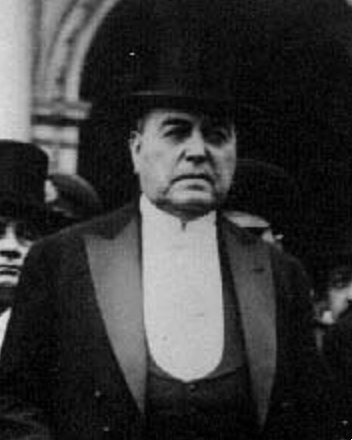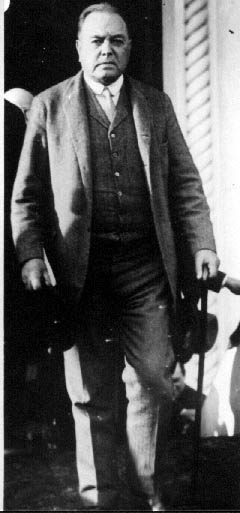<Back to Index>
- Philosopher Nikolay Gavrilovich Chernyshevsky, 1828
- Painter Eugène Boudin, 1824
- President of Argentina Juan Hipólito del Sagrado Corazón de Jesús Yrigoyen Alem, 1852
PAGE SPONSOR


Juan Hipólito del Sagrado Corazón de Jesús Yrigoyen Alem (July 12, 1852 – July 3, 1933) was twice President of Argentina (from 1916 to 1922, and again from 1928 to 1930). His activism became the prime impetus behind the achievement of universal (male) suffrage in Argentina in 1912.
He was born in Buenos Aires, and worked as a school teacher before entering politics. In 1891 he co-founded the Radical Civic Union (Unión Cívica Radical), together with his uncle, Leandro Alem. Yrigoyen (he signed that way to distinguish himself from Bernardo de Irigoyen's political ideas) was popularly known as "el peludo" (the hairy armadillo) due to his introverted character and aversion to being seen in public. Following Alem's suicide in 1896, Hipólito Yrigoyen assumed sole leadership of the Radical Civic Union. It adopted a policy of intransigency, a position of total opposition to the regime known as "The Agreement". Established by electoral fraud, this was an agreed formula among the political parties of that time for alternating in power.
The Radical Civic Union took up arms in 1893 and again in 1905. Later, however, Yrigoyen adopted a policy of nonviolence, pursuing instead the strategy of "revolutionary abstention", a total boycott of all polls until 1912, when President Roque Sáenz Peña was forced to agree to the passage of the Sáenz Peña Law, which established secret, universal, and compulsory male suffrage. Yrigoyen was elected President of Argentina in 1916. He frequently found himself hemmed in, however, as the Senate was appointed by the legislatures of the provinces, most of which were controlled by the opposition. Several times, Yrigoyen resorted to federal intervention of numerous provinces by declaring a state of emergency,
removing willful governors, and deepening the confrontation with the
landed establishment. Pro-Yrigoyen political supporters were known as "personalistas", a blunt suggestion that they were sycophants of Yrigoyen, anti-Yrigoyen elements, not surprisingly, were known as "anti-personalistas". Yrigoyen
was popular, however, among middle and working class voters, who felt
integrated for the first time in the political process, and the Argentinian
economy prospered under his leadership. Yrigoyen preserved Argentine
neutrality during World War I,
which turned out to be a boon, owing to higher beef prices and the
opening up of many new markets to Argentina's primary exports (meat and
cereals). Yrigoyen also promoted energy independence for the rapidly growing country, obtaining Congressional support for the establishment of the YPF state oil concern, and appointing as its first director General Enrique Mosconi, the most prominent advocate for industrialization in the Argentine military at the time. Following four years of recession caused by war-related shortages of credit and supplies, the Argentine economy experienced
significant economic growth, expanding by over 40% from 1917 to 1922.
Argentina was known as "the granary of the world", its gross domestic
product per capita placing it among the wealthiest nations on earth. Constitutionally barred from re-election, Yrigoyen was succeeded by Marcelo Torcuato de Alvear. On the expiration of Alvear's term in 1928, Yrigoyen was overwhelmingly elected President for the second time. In December of that year, U.S. President-elect Herbert Hoover visited Argentina on a goodwill tour,
meeting with President Yrigoyen on policies regarding trade and
tariffs. Radical anarchist elements attempted to assassinate Hoover by
attempting to place a bomb near his rail car, but the bomber was
arrested before he could complete his work. President Yrigoyen
accompanied Hoover thereafter as a personal guarantee of safety until
he left the country. In
his late seventies, he found himself surrounded by aides who censored
his access to news reports, hiding from him the reality of the effects
of the Great Depression, which hit towards the end of 1929. On December 24 of this year he survived an assassination attempt. Fascist and conservative sectors of the army and among the intelligentsia (such as Leopoldo Lugones) plotted openly for a regime change, as did Standard Oil of New Jersey, who opposed both the president's efforts to curb oil smuggling from Salta Province to Bolivia, as well as the existence of YPF, itself. On September 6, 1930, Yrigoyen was deposed in a military coup led by General José Félix Uriburu. This was the first military coup since the adoption of the Argentine constitution. After his overthrow, Yrigoyen was placed under house arrest and confined several times to Isla Martín García. He died in Buenos Aires in 1933. Hipólito Yrigoyen was buried in La Recoleta Cemetery in Buenos Aires.